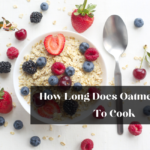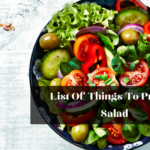Breakfast is an excellent method to begin the day. A nourishing brunch can provide sustained energy and keep you satisfied for hours. A nutritious breakfast is typically rich in fiber, protein, healthy lipids, and micronutrients. This article, will explain what are healthy things to eat for breakfast.
Healthy Things To Eat For Breakfast
1. Yogurt
Yogurt is a highly nourishing food that combines all three macronutrients (protein, carbohydrates, and fat) in one tasty package (especially if you select a fat-containing variant). Yogurt is a substantial and delicious base for a parfait of berries, nuts, and granola and a protein-packed smoothie. Yogurt contains probiotics, making it a gut-healthy option for a morning pick-me-up.
In addition, while the saturated fat content of full-fat yogurt may raise red flags, the fermentation process in producing yogurt converts some saturated fatty acids into heart-healthier unsaturated fats. In addition, full-fat yogurt in the morning has greater lasting power than non-fat yogurt.
2. Eggs
Eggs have been a breakfast staple in the United States for decades, and they are an excellent way to add healthful protein to any morning meal. While egg yolks contain a small amount of dietary cholesterol, eating whole eggs a few times per week is a very nutritious choice that should not hinder your efforts to maintain heart health.
However, if you need to be particularly careful about your cholesterol levels (and your doctor or nutritionist has suggested making dietary changes to assist), choose egg whites.
3. Chia Pudding
Although it has only recently gained popularity, chia seed pudding is here to stay, particularly for breakfast. Chia pudding is simple to prepare in advance for a rapid grab-and-go snack and is rich in fiber, protein, and omega-3 fatty acids. These will leave you feeling energized and support your digestive system and overall health.
4. Oatmeal
Oatmeal is an adaptable and wholesome breakfast option. It can be prepared with either rolled or steel-cut oats. However, steel-cut oats have a chewier texture and a slightly nuttier flavor.
Top the oatmeal with sliced bananas, strawberries, blueberries, minced nuts (such as almonds), and honey or pure maple syrup to improve the flavor and nutritional value.
Consider incorporating pulverized flaxseeds or chia seeds to increase the amount of fiber and omega-3 fatty acids.
5. Whole Grain Toast
Whole grain toast is always a great part of a healthy diet, whether it’s topped with nut butter and bananas, mashed avocado, smoked salmon, and cream cheese, or a runny egg. Whole grain bread gives you more energy for a busy day because it has fiber, vitamins, and minerals that white bread doesn’t have.
Avocado toast is also a tasty and filling breakfast, and you can add a fried egg on top for extra protein.” Complex carbohydrates like those in low-sugar cereals, crepes, and tortillas will help you feel full. Other whole grain goods, like low-sugar cereals, will do the same.
6. Smoothie
Smoothies are a great way to get many different kinds of nutrients in one meal. Begin with spinach or kale as the base to get more vitamins and minerals.
Add frozen fruits such as berries, mango, or pineapple for flavor and antioxidants. The protein content is increased by adding a dollop of Greek yogurt or a plant-based protein powder.
Don’t include healthy fats such as almond butter, nuts, or avocado for creaminess and sustained energy.
7. Fruit Salad
A colorful and revitalizing breakfast option is a fruit salad. Utilize seasonal fruits for maximum flavor and diversity.
Add diced pineapple, kiwi, and papaya for a tropical twist, or keep it uncomplicated with a mixture of berries and citrus.
Greek yogurt or cottage cheese lends creaminess and protein to a dish.
8. Cottage Cheese
Cottage cheese is high in protein and combines with sweet and savory ingredients.
Mix it with diced peaches or pineapples for a sweet option, or garnish it with diced cucumber, cherry tomatoes, and black pepper for a savory option.
Additionally, cottage cheese can be incorporated into smoothies to add creaminess and protein.
9. Chia Pudding
Chia pudding is a nutritious brunch that can be prepared in advance. Combine chia seeds with almond milk (or your preferred milk) and honey or vanilla extract.
Allow it to remain overnight in the refrigerator to thicken. Add texture and flavor in the morning by topping it with fresh berries, sliced bananas, or chopped nuts.
10. Whole Grain Pancakes Or Waffles
Choose pancake or waffle mixes with whole grains, or make your mixture with whole-grain flour. There are many healthful pancake and waffle recipes available online.
They can be garnished with fresh fruit, yogurt, cottage cheese, or maple syrup. Consider adding a tablespoon of protein powder to the batter for added protein.
11. Avocado Toast
Avocado toast is both trendy and good for you. To add a hint of spice, mash ripe avocado onto whole-grain toast and sprinkle with a pinch of pepper, salt, and red pepper flakes.
Leftover
Feel free to repurpose last night’s dinner remains into a nutritious breakfast. Incorporating lean proteins such as grilled chicken or tofu and roasted vegetables into omelets, breakfast burritos, and breakfast dishes is possible.
Benefits
- Energy Boost: Breakfast replenishes your body’s energy levels and makes you feel more conscious and alert by providing essential nutrients and calories after an overnight fast.
- Improved Concentration and Focus: A well-balanced breakfast can improve cognitive function, memory, and focus, making it simpler to maintain concentration on work or school tasks.
- Weight Management: Breakfast can help modulate appetite and reduce the likelihood of overeating later in the day, aiding in weight management. It revs up your metabolism, which can help with weight management.
- Better Intake of Nutrients: A well-balanced breakfast can help you get all of the vitamins, minerals, carbohydrates, and macronutrients you need for the day.
- Controlling Blood Sugar: Breakfast rich in complex carbohydrates, fiber, and protein can help balance blood sugar levels, minimizing energy dumps and mood swings.
- Muscle Preservation: Breakfasts abundant in protein promote muscle maintenance and growth, essential for individuals who engage in physical activity or resistance training.
- Heart Health: A nutritious breakfast may reduce the risk of developing heart disease by providing heart-healthy nutrients such as fiber, antioxidants, and healthy fats.
- Better Mood: Breakfast can positively affect mood and reduce irritability and anxiety, enhancing emotional health.
- Enhanced Digestion: Breakfasts high in fiber promote healthy digestion and regular bowel movements, reducing the risk of constipation.
- Reduced Risk of Nutrient Deficiencies: Consuming a nutritious breakfast regularly can reduce the risk of nutrient deficiencies when meals are omitted or neglected.
It is essential to remember that the quality of your breakfast is equally as important as the act of consuming it. To optimize these advantages, select nutrient-dense foods such as whole grains, lean proteins, fruits, vegetables, and healthy fats while limiting added sugars, refined carbohydrates, and processed foods. Consult a healthcare professional or registered dietitian if you have specific dietary concerns or goals, as it is essential to customize your breakfast to your particular nutritional needs and preferences to obtain these benefits.
Thanks for reading.










